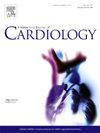Prognostic role of genetic variants in recurrent pericarditis
IF 3.2
2区 医学
Q2 CARDIAC & CARDIOVASCULAR SYSTEMS
引用次数: 0
Abstract
Background
Recent interest in the genetic basis of pericarditis has prompted investigation into the prognostic relevance of disease-associated genetic variants (DAVs), particularly in recurrent pericarditis (RP). Autoinflammatory mechanisms have been implicated in RP, suggesting that genetic predisposition may influence disease severity, treatment response, and long-term outcomes. This study aimed to evaluate the prognostic impact of DAVs in adults with RP.
Methods
A prospective observational cohort study was conducted at a tertiary referral centre for pericardial diseases, enrolling all consecutive adult patients with at least three RP episodes between October 2017 and December 2021. Whole exome sequencing was used to identify DAVs.
Results
Of the 131 patients included, 30 (22.9 %) were found to carry a DAV. Compared with those without DAVs, these patients more frequently exhibited systemic inflammatory features, including elevated C-reactive protein (>10 mg/L in 93.3 % vs 77.7 %, p = 0.049) and fever (76.7 % vs 49.5 %, p = 0.008). After a median follow-up of 47 months (IQR 34–75), long-term remission was achieved in only 33.3 % of DAV carriers, compared to 67.3 % in the control group (log-rank p = 0.03). In multivariable Cox regression analysis, the presence of a DAV remained independently associated with a reduced likelihood of achieving sustained remission (HR 0.468, 95 % CI 0.240–0.984; p = 0.045).
Conclusions
This is the first study to assess outcomes in RP patients with DAVs. Approximately one in four patients showed a genetic predisposition, which was linked to a larger inflammatory burden and a significantly lower probability of long-term remission, highlighting the prognostic value of genetic testing in RP.

遗传变异在复发性心包炎中的预后作用。
背景:最近对心包炎遗传基础的兴趣促使研究疾病相关遗传变异(DAVs)与预后的相关性,特别是复发性心包炎(RP)。自身炎症机制与RP有关,表明遗传易感性可能影响疾病严重程度、治疗反应和长期预后。本研究旨在评估dav对成年RP患者预后的影响。方法:在心包疾病三级转诊中心进行了一项前瞻性观察队列研究,纳入了2017年10月至2021年12月期间至少三次RP发作的所有连续成年患者。采用全外显子组测序鉴定dav。结果:131例患者中,发现30例(22.9 %)携带DAV。更频繁地与那些没有dav相比,这些患者表现出系统性炎症特征,包括c反应蛋白升高(> 10 % 93.3 vs 77.7 mg / L %,p = 0.049)和发烧(76.7 vs 49.5 % % p = 0.008)。在中位随访47 个月(IQR 34-75)后,只有33.3% %的DAV携带者实现了长期缓解,而对照组为67.3% % (log-rank p = 0.03)。在多变量Cox回归分析中,DAV的存在仍然与实现持续缓解的可能性降低独立相关(HR 0.468, 95 % CI 0.240-0.984; = 0.045页)。结论:这是第一个评估RP合并dav患者预后的研究。大约四分之一的患者表现出遗传易感性,这与更大的炎症负担和更低的长期缓解可能性有关,突出了RP基因检测的预后价值。
本文章由计算机程序翻译,如有差异,请以英文原文为准。
求助全文
约1分钟内获得全文
求助全文
来源期刊

International journal of cardiology
医学-心血管系统
CiteScore
6.80
自引率
5.70%
发文量
758
审稿时长
44 days
期刊介绍:
The International Journal of Cardiology is devoted to cardiology in the broadest sense. Both basic research and clinical papers can be submitted. The journal serves the interest of both practicing clinicians and researchers.
In addition to original papers, we are launching a range of new manuscript types, including Consensus and Position Papers, Systematic Reviews, Meta-analyses, and Short communications. Case reports are no longer acceptable. Controversial techniques, issues on health policy and social medicine are discussed and serve as useful tools for encouraging debate.
 求助内容:
求助内容: 应助结果提醒方式:
应助结果提醒方式:


